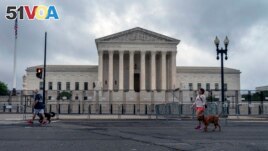23 June 2022
The U.S. Supreme Court ruled Thursday that a New York law requiring a special reason to carry a gun in public is unconstitutional.
The decision represents a major expansion of gun rights in states with similar laws. It also comes when there is political division over the issue of gun laws and concerns over gun violence.
The court's 6-3 decision follows recent mass shootings in such places as an elementary school in Uvalde, Texas, and a food store in Buffalo, New York. The ruling also was issued as the U.S. Congress is working on legislation dealing with guns.

People walk dogs past anti-scaling fencing erected around the U.S. Supreme Court in Washington, June 23, 2022. (AP Photo/Gemunu Amarasinghe)
Justice Clarence Thomas wrote for the majority. He said that the U.S. Constitution protects "an individual's right to carry a handgun for self-defense outside the home."
The majority of justices struck down a New York law requiring people to show a "proper cause" or specific need in order to get a permit to carry a gun in public. The justices said the requirement violates the Second Amendment right to "keep and bear arms" and the Fourteenth Amendment.
Justice Stephen Breyer and two other justices disagreed with the majority's ruling. He wrote, "Since the start of this year alone (2022), there have already been 277 reported mass shootings—an average of more than one per day."
New York Governor Kathy Hochul, who is a member of the Democratic Party, said the court's decision comes at a painful time. She said the state is still mourning the deaths of 10 people in a mass shooting at a Buffalo-area food store.
She called the decision "reprehensible," meaning it is something that should be criticized. She also said, "It's not what New Yorkers want."
American President Joe Biden, also a Democrat, said, "This ruling contradicts both common sense and the Constitution, and should deeply trouble us all." He added that, after the shootings in Buffalo and Uvalde, "...we must do more as a society - not less - to protect our fellow Americans."
Wayne LaPierre is a leader of the gun rights organization National Rifle Association. He called the court's decision a "win for good men and women all across America."
He said in a statement: "The right to self-defense and to defend your family and loved ones should not end at your home."
New York's law has been in place since 1913. Under the law's "proper cause" requirement, people seeking an unrestricted concealed carry permit must show a need for self-defense. State officials also gave restricted licenses to carry a weapon for specific purposes such as hunting, target shooting, or going to and from their place of business.
Firearms safety groups and gun control activists feared that a ruling against New York's law would lead to more guns on the streets and higher rates of violent crime. They feared that such a ruling could endanger bans on guns in sensitive places such as airports, courthouses, hospitals and schools.
The ruling is the high court's first major gun decision in more than 10 years. It affects Americans living in several states including California, Hawaii, Maryland, Massachusetts, New Jersey and Rhode Island. These states have similar laws to New York's.
The Supreme Court last issued a major gun decision in 2010. In that decision and also in a ruling in 2008, the justices confirmed a nationwide right to keep a gun at home for self-defense. In Thursday's decision, the court expanded the right to carry a gun outside the home.
The court's decision to expand gun rights comes as gun laws are a hotly disputed political issue.
A Pew Research Center study in 2021 found that over half of Americans, 53 percent, say gun laws should be stricter than they are currently. The study said that opinion was held by 81 percent of Democrats and Democratic-leaning independents. But only 20 percent of Republicans and Republican supporters agreed.
I'm Jonathan Evans.
Hai Do adapted this story for VOA Learning English based on reporting from The Associated Press, Reuters and other sources.
__
Words in This Story
proper –adj. correct based on social or moral rules
contradict –v. to not agree with in a way that shows or suggests something is false
concealed –adj. hidden from sight
We want to hear from you. Write to us in the Comments section, and visit 51VOA.COM.










